
"Both my autism and Sensory Processing Disorder have given me the ability to be hyper-focused on creative tasks."
Emily
- on autism, graphic design and creativity
Image copyright: @21andsensory
Stories from the Spectrum: Emily
Meet the multi-talented Emily, an autistic graphic designer, illustrator and blogger. As well as being autistic, Emily has diagnosis of Sensory Processing Disorder (SPD). You can admire her latest artwork by visiting her Instagram page here.
We chatted to Emily about her diagnosis journey, what life on the spectrum is like for her, where she draws her artistic inspiration from, and overcoming 'creative block'...
When were you diagnosed as autistic?
In 2018 I decided to pay for private therapy after having lots of different therapies throughout my teens and adulthood. I had tried Cognitive Behavioural Therapy (CBT) and therapy sessions with CAMHS (child and adolescent mental health service, NHS, UK) Unfortunately I found these to be unhelpful.
In June 2018, aged 24, I was told by my private therapist at the time that she strongly felt I had a lot of autistic traits and she urged me to go forward for a diagnosis through my GP. My therapist felt unable to support me further, which was initially very difficult because I'd just started to really open up and trust my therapist more. I had always had a slight feeling I might be on the spectrum but I’d never really properly considered going forward for a diagnosis as it had never been picked up within my childhood. I did know I had sensory issues from a young age as an occupational therapist had assessed me aged eight and told me I had Sensory Processing Disorder.
I decided to go to my local doctors' surgery and discussed wanting to go forward for a diagnosis. I didn’t really get anywhere as my doctor wasn't very understanding. Undeterred, I went back to the surgery again and saw another doctor who was much more understanding. She agreed to refer me but pre-warned me that the waiting time suggested was nine months.
In the end I was on an NHS waiting list for 14 months and I had my autism assessment on 8 November 2019. I found out I was autistic aged 25.
What is being autistic like for you?
I still feel like I haven’t known that I’m autistic for that long! If I am honest, life is difficult and can be a struggle. There are good days of course - but sometimes the bad days outweigh them and I get frustrated. However, I am so much kinder to myself since my diagnosis because I know and understand my difficulties better now. There are days I wish to be 'normal', whatever that is! But I know I would never change who I am - being autistic and having SPD make me who I am. They make me unique and I believe they can also be real strengths.
My mood can change so quickly if I am overwhelmed by something as I cannot filter the information coming into my brain and I cannot regulate my emotions or understand and label my own feelings. I was told by my autism assessor that this is referred to as Alexithymia. This means day-to-day it can be quite tiring being out in the world and as a result I've become very good at masking (hiding my true thoughts and feelings) and I can only really drop that mask when I am in a safe environment like my home.
I hate change, love structure and routine and crave sameness every day. Obviously, life doesn't tend to pan out the same each day which is frustrating but I've become better at adapting to things.
My diagnosis was a really big thing for me internally and I honestly feel like I finally have some closure. Being able to say ‘I’m autistic’ just sums up all my difficulties into one understandable label or saying, which is really important to me. For so long I have been unable to summarise my difficulties quickly, always having to delve into the specifics of my sensory problems and social struggles.
Would you be able to tell us a bit more about Sensory Processing Disorder and how it impacts you?
I find it really difficult to process information I receive through my senses and this makes daily life a struggle. To me the world is ridiculously loud, bright, too strong smelling, crowded and just generally too much to handle. Sensory processing issues are a constant thing for me - my senses are ridiculously heightened at all times so even little things such as someone touching me on the shoulder/arm during a conversation or having to cope with different levels of noises and mixing scents can hugely overwhelm me.
I also get drained very quickly from any social interactions and can suffer something I refer to as 'sensory overwhelm' or a 'sensory hangover'. It's a term I’ve started to use to describe the state in which I am left after being in an overwhelming place, environment or situation. It describes the physically tired, mentally drained and totally spaced out feeling I have after an overwhelming social interaction. The feeling of a 'sensory hangover' will come over me immediately after an overwhelming thing and can last from a few minutes to even a day.
Sometimes I can hide my sensory problems and I am able to 'mask' or hide my struggles. Other times I can't and I erupt into a meltdown and have weird and unexplainable emotions. This is difficult because people don't expect a grown adult to have a meltdown, so it's something I can only really express in private. I have to bottle up how I feel when I'm out and about. Nowadays I try to be way more conscious of where I go, for how long, and what will be there that could affect me. I say ‘no’ more often to plans and activities now (although I do experience a lot of FOMO - 'fear of missing out') I know it’s for the better and I am way way happier not going and having a chilled night in. Sound is a huge issue for me and can really quickly bring on a sensory hangover – I feel physically drained and unable to process or compute what people are saying in noisy situations that I just prefer to remove myself from them entirely.
Your illustrations are fantastic. How did you get into graphic design and where do you draw inspiration from?
Thank you! I think I always enjoyed and looked forward to art classes throughout primary and secondary school. I studied both Art and Graphic Design at GCSE and then A Level. I remember deciding aged 16 that I wanted to become a graphic designer as graphic design became a real passion for me. I studied an Art Foundation Degree and after that I decided that I definitely wanted to study graphic design further and was accepted onto a BA (Hons) Graphic Design Degree and later went on to graduate with a first class degree!
I think I started doing illustrations because I am a really visual person and I find things come across better sometimes if they are written down and drawn. I think people can easily understand and relate to my little illustrations because I use a lot of iconography to symbolise what I am talking about and that makes things a lot clearer.
I draw a lot of inspiration from everyday things, like my surroundings. I'm a great believer in the idea that we should 'look up more' - by this I mean look up from our screens and devices and really take in the sky above us, our environment and surroundings and just generally the world around us. It can truly be a great source of inspiration, especially if you are having a creative block. I like to think of myself as an explorer of the world and document little findings along the way. There are things to be inspired by everywhere if we look up more.
"I draw a lot of inspiration from everyday things like my surroundings. I'm a great believer in the idea that we should 'look up more'."
So many people have also inspired me. I follow so many fantastic designers and illustrators online and they are a great source of inspiration for me. The autism community online on places such as Instagram has been fantastic - so encouraging and welcoming and helpful when it comes to sharing coping mechanisms and I've met some incredible people who have become good friends.
How does being autistic influence your approach to your work?
I think in terms of being autistic I am quite a creative person and this enables me to have a fresh outlook and different perspective of the world around me, especially as I am more in tune with all things sensory! I really love being able to communicate via different mediums such as my blog, Instagram illustrations and my own podcast. Sometimes I'll want to communicate something and it'll come across best via audio rather than visually and I like being able to go between different platforms to share what I want to say.
I’m a really visual person so I love being a graphic designer - it's luckily something that comes quite naturally to me. I think both my SPD and autism have given me the ability to hyper-focus in on creative tasks at work but also in my own side-projects too. I can quite easily lose track of time if I am really invested and passionate about what I'm doing. I am also a very dedicated worker and a real perfectionist, which isn't always good as I can get a bit obsessive. However, mostly I think these both help me creatively.
"I think both my Sensory Processing Disorder and autism have given me the ability to hyper-focus in on creative tasks at work but also in my own side-projects too."
Routine is a massive thing for me. I enjoy having a full-time job that keeps me busy 9am-5pm during the week. It's something I can really set my mind to and I need this structure in my life in order to exist.
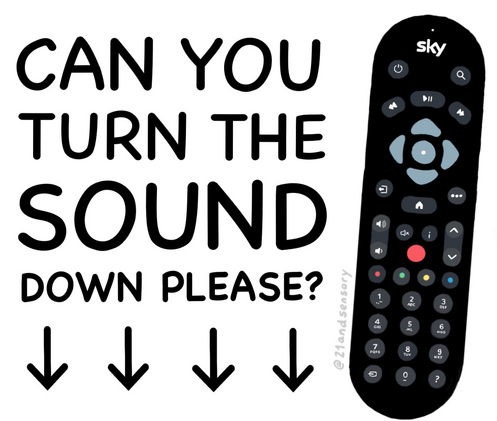
'Can you turn the sound down please?' by Emily
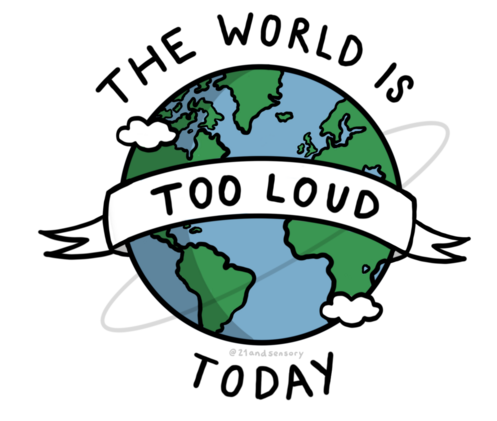
'The world is too loud today' by Emily
If you could dispel one stereotype or myth about autism, what would it be?
I would like to dispel the stereotype of 'looking autistic'. I have unfortunately been in an uncomfortable scenario which involved being told by a consultant at a hospital appointment that I didn't 'look autistic', as I brought up my upcoming autism assessment as part of my medical history.
I felt like this shouldn’t have been said and I remember at that time thinking it over afterwards and it was actually really harmful. To say to someone ‘you don’t look autistic’ is not in any way ok. At the time I was awaiting my assessment which was quite personal and private to me.
It's very important to remember that you cannot tell if someone is autistic by looking at them. Looks have absolutely nothing to do with it.
How have you been coping with the current coronavirus restrictions and the easing of lockdown? Do you have any advice for autistic people who may be struggling?
If I'm honest it has been quite difficult for me. My last day in the office I work in was 25 March 2020 and since then I have been working from home. I know I am very lucky to be able to work from home but I was initially very worried about all this change in routine and structure and I felt extremely sensory overloaded by it all. I've had a few sensory and autistic meltdowns as I've found it quite hard to process all this change as well as the constant stream of news.
I usually work in an open plan office which has honestly been an absolute nightmare for me as an autistic person. I've really made the most of trying out remote-working and I am loving it! I've managed to set-up my own home office in my bedroom and tailored the environment to suit me. Also, I have created a routine to my working days as structure really helps me.
I know it's going to be difficult to get back into what were my more 'normal' habits. I know I will be way more sensitive to things such as noise, touch and smell. I'll have to work hard to build up the confidence to cope and also desensitise myself to these things again, which neurotypical people might not consider or appreciate. Also, in terms of mental health I think it might take a bit of a toll on my wellbeing too. I have been working on creating little steps that are achievable and will slowly build up to me being out and about more.
My advice to autistic people:
Try to be kind to yourself
(easier said than done, I realise). Self-care is really important in a time like this in order not to get too overloaded by all that's going on in the world. Create some downtime daily if you can and don't forget to use fidget toys, stimming, etc to self-regulate.
Why not create a routine?
You could print out and decorate a weekly calendar using coloured pens and other stationery and craft bits to block out time for work or study, downtime, video chats and catchups, time to read or play video games, etc. These chunks might help to break up your day into easier to see sections and give you smaller goals to work towards.
It's going to be tricky to get back out...
into the big wide world, just like how it was tricky to go into lockdown initially. We aren't great with change and that's okay - it's just important to keep trying to communicate with friends, family, even colleagues each day (if you can) and explain how they might be able to support you if you do feel you are struggling.
And for anyone working from home:
I read a tweet by Neil Webb online that said, "You are not working from home; you are at your home during a crisis trying to work." This really helped me and I hope it can help others as just reframing our thinking like this can be quite helpful.
We are all doing our best - that's all anyone can ever ask of us.
Get support and advice on coronavirus
Visit our coronavirus guidance pages to find the latest updates, how these changes impact autistic people and their families, and how we can help you during these uncertain times.
Similar stories
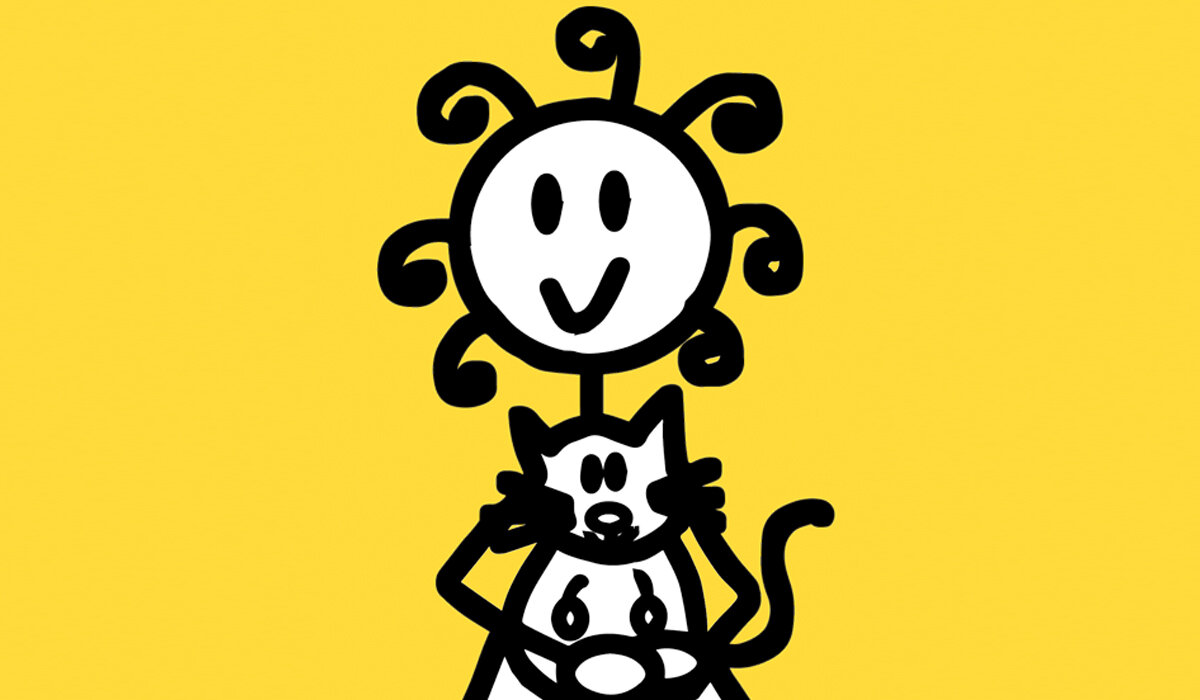
"I used The Girl with the Curly Hair character to explain what being autistic can be like."
Alis Rowe
- on creating 'The Curly Hair' project
Read more
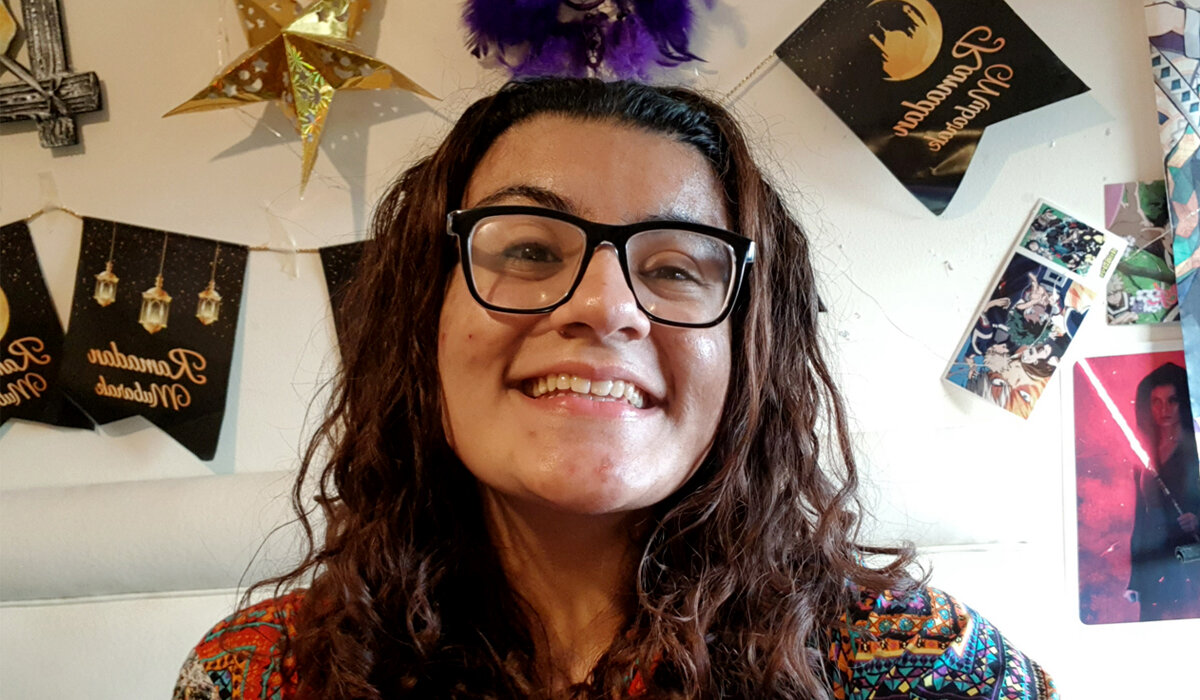
"I want to give a voice to people who are not often represented in pop culture."
Iqra Babar
- on representing BAME autistic people through her art
Read more
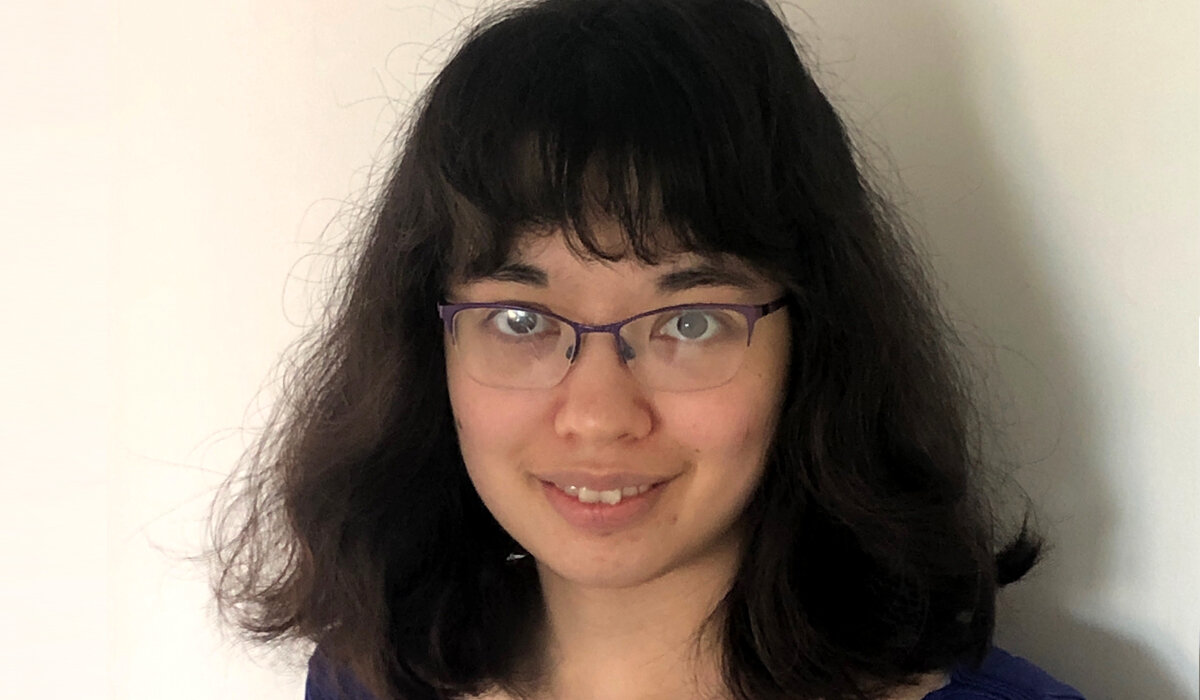
"Autism is a significant part of my life but not the only part, and I want my blog to reflect that."
Grace Liu
- on autism and blogging
Read more

The Spectrum magazine
Explore one of the UK's largest collections of autistic art, poetry, and prose. The Spectrum magazine is created by and for autistic people, and is available both online and in print.
Read the Spectrum





You are not alone
Join the community
Our online community is a place for autistic people and their families to meet like-minded people and share their experiences.
Join today